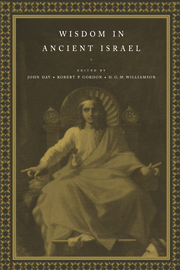Book contents
- Frontmatter
- Contents
- List of abbreviations
- Introduction
- Part 1 The ancient near eastern setting
- Part 2 Old Testament and Apocryphal texts
- 4 Foreign Semitic influence on the wisdom of Israel and its appropriation in the book of Proverbs
- 5 The limits of theodicy as a theme of the book of Job
- 6 Qoheleth
- 7 A house divided: wisdom in Old Testament narrative traditions
- 8 Wisdom in Solomonic historiography
- 9 Amos and wisdom
- 10 Hosea and the wisdom tradition: dependence and independence
- 11 Isaiah and the wise
- 12 Jeremiah and the wise
- 13 The wisdom psalms
- 14 Wisdom and Daniel
- 15 Ecclesiasticus: a tract for the times
- 16 The Christian use and the Jewish origins of the Wisdom of Solomon
- Part 3 Themes
- Biographical note: John Adney Emerton
- Bibliography of the works of John Adney Emerton
- Indexes
- Principal biblical and apocryphal references
6 - Qoheleth
Published online by Cambridge University Press: 16 October 2009
- Frontmatter
- Contents
- List of abbreviations
- Introduction
- Part 1 The ancient near eastern setting
- Part 2 Old Testament and Apocryphal texts
- 4 Foreign Semitic influence on the wisdom of Israel and its appropriation in the book of Proverbs
- 5 The limits of theodicy as a theme of the book of Job
- 6 Qoheleth
- 7 A house divided: wisdom in Old Testament narrative traditions
- 8 Wisdom in Solomonic historiography
- 9 Amos and wisdom
- 10 Hosea and the wisdom tradition: dependence and independence
- 11 Isaiah and the wise
- 12 Jeremiah and the wise
- 13 The wisdom psalms
- 14 Wisdom and Daniel
- 15 Ecclesiasticus: a tract for the times
- 16 The Christian use and the Jewish origins of the Wisdom of Solomon
- Part 3 Themes
- Biographical note: John Adney Emerton
- Bibliography of the works of John Adney Emerton
- Indexes
- Principal biblical and apocryphal references
Summary
Although it has only twelve chapters, the book of Qoheleth poses a number of problems for the reader who has deduced its lateness and pseudonymity from the nature of its language. The connection with King Solomon, which is suggested by the superscription in i 1 (cf. b. Megilla, fol. 7a), is founded on a failure to recognize i 12–ii 11 (26) as a ‘royal fiction’, and the usual translation of the Hebrew qōhelet on a misunderstanding by the ancient versions, which overlooked the original meaning of the term, ‘assembly leader’. We should probably picture the writer as a scribe who also worked as teacher, recording the results of the discussions which he led in school. By using catch-phrases and favourite expressions, and by exhausting the stylistic possibilities of Hebrew proverbial wisdom and of poetry, he has lent his work the unmistakable flavour of fine writing.
The prominence which Qoheleth gives to the personal-account form, and the emphasis which he places on the individual path to knowledge, correspond to his break with the ideas which were presupposed in the wisdom tradition of his people: he clearly lived at a time when old beliefs were being questioned, and when the individual, no longer able to depend upon them, was forced to find his own way. Qoheleth therefore presents himself as a teacher in a time of change, who feels compelled to contrast tradition with situation, the traditional words of the wise with his own observations, and to draw his own conclusions. Moreover, if it is not really marked, the influence of Greek-Hellenistic writing and thought is certainly demonstrable.
- Type
- Chapter
- Information
- Wisdom in Ancient Israel , pp. 83 - 93Publisher: Cambridge University PressPrint publication year: 1995
- 1
- Cited by

